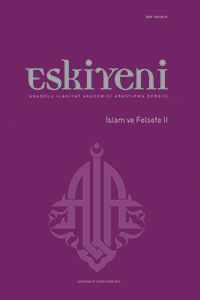İbn Sina’nın Varlık-Mâhiyet Ayniliği/Ayırımının Aquinas’ın Eleştirileri Bağlamında Değerlendirilmesi
Revisiting the Essence-Existence Distinction in Ibn Sina in the Critiques of Aquinas
Author(s): Mehmet Ata AzSubject(s): Philosophy, Metaphysics, Theology and Religion, Islam studies, Philosophy of Middle Ages, Middle-East Philosophy, Philosophy of Religion
Published by: Anadolu İlahiyat Akademisi
Keywords: Ibn Sina; essence and existence; Thomas Aquinas; God; Islamic philosophy;
Summary/Abstract: İbn Sînâ was the first philosopher who addressed the distinction of essence-existence, which is essential as far as the basic, in a systematic way and discussed it in the philosophical context in Islamic and Western thoughts. His approach is in parallel with Aristotle’s approach which identified being in terms of being as the subject of metaphysics and distinction of essence-existence. İbn Sînâ’s approach has become one of the most basic arguments in meta-ontology. Over time, İbn Sînâ deeply influenced Latin philosophers’ meta-ontologies. There were many scholastic philosophers such as Thomas Aquinas who used the identity and the distinction of the essence-existence and have built up their ontologies as much as their metaphysics upon it. In this study, we will examine İbn Sînâ’s and Aquinas’s approaches of the distiction of essence-existence key concepts in the context of criticism of Aquinas, then we will examine the value of criticism of Aquinas that İbn Sînâ negated essence which made the concept of God meaningless.
Journal: Eskiyeni
- Issue Year: 2014
- Issue No: 29
- Page Range: 75-102
- Page Count: 28
- Language: Turkish

